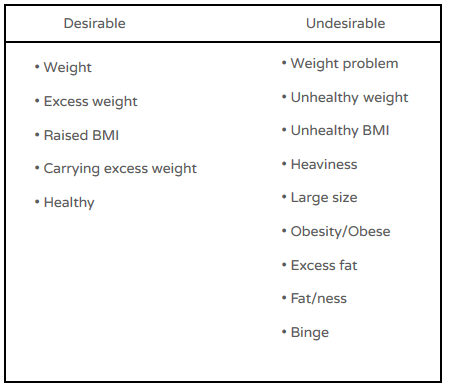-
Having a respectful approach
-
How to start the conversation
-
Desirable and undesirable phrases
-
Potential patient responses
-
Considerations for patients with high BMIs
Having a respectful approach
To avoid making women feel targeted or "picked on" it's important to highlight that measuring their height, weight and BMI is a standard element of your practice with pregnant women. It is done so that women are fully informed about what they can do to ensure they have the healthiest pregnancy possible.
Although a patient may not appear to be at risk of gaining an unhealthy amount of weight, informing them of a healthy weight gain goal for them hands back some responsibility about their health for their own and their baby's benefit.
An open, supportive and non-judgmental environment is the best way to help them achieve the healthiest possible pregnancy and birth. It is best to introduce the topic towards the end of the consultation, after rapport has been established, or wherever it comes up naturally.
Remember your task is to renew parents' confidence in themselves and in their role and to show them how to proceed.
How to start the conversation
The following is an example of how you could introduce the topic:
"One thing I wanted to cover with you today is how much weight you can expect to gain during this pregnancy. I like to discuss this with every patient so that they have realistic expectations about pregnancy and are aware of the need to have a healthy weight during pregnancy. I have this pamphlet that I would like to give you that outlines some of the ways to have a healthy pregnancy. Let's go through the first page together…"
The first page of the pamphlet explains what a healthy pregnancy weight is and includes the relevant weight gain recommendations.
To calculate your patients BMI click here and to access the Recommendations Table click here.
Desirable and undesirable phrases

Potential patient responses
It's important to acknowledge and explore patients' feelings about the use of BMI as a means of determining healthy pregnancy weight.
Here are some of the potential reactions some patients may have to discussing their weight:
- "I should be eating for two, not reducing my intake. Otherwise my baby
won't get enough and will be born with a low birth-weight":
There are actually no increased energy needs for pregnant women during the 1st trimester. In the 2nd and 3rd trimester, increased energy requirements are mainly related to the need to store fat for breastfeeding so if they are sufficient fat stores already there is no need to actively increase energy intakes. The GWG recommendations take this into account.
There is, however, a greater need for specific nutrients (e.g. folate, calcium, iron) - so the best approach is to eat twice as healthy, not twice as much.
- "I am naturally larger because of my genes":
While genes determine susceptibility to having a high BMI, environments determine the expression of the condition. Although metabolic programming makes weight management tougher it is still possible with a direct and informed approach.
- "I am unfairly labelled as being 'unhealthy'. You can have a high BMI and be healthy":
Research into the risks associated with having a high BMI in pregnancy indicates that it is an independent risk factor, regardless of health status (e.g. fitness [cardiovascular/respiratory], cholesterol, blood pressure).
- "I have tried to lose weight before and it hasn't worked":
Explore what they did in past attempts to lose weight - identify fad diets, restrictive eating, black and white thinking, and insufficient exercise.
Considerations for patients with high BMIs
Women with high pre-pregnancy BMI's enter pregnancy with elevated health risks, which makes having a healthy pregnancy even more important:
-
The effects of gaining excess weight during pregnancy transfer to the next generation, as do the positive effects of a healthy pregnancy weight.
-
This means that women have an opportunity to have a positive impact on their baby's health before he/she even arrives into this world.
For example, research* tells us that:
- A healthy diet and regular physical activity (≥3 days per week) during pregnancy can reduce a baby's chances of getting some diseases in later life, including cancer, heart disease, allergies, asthma, diabetes, and mental illness;
- Pregnancy weight gain within the recommendations positively influences a baby's fat and lean muscle tissue at birth and their growth trajectory reducing the chances of being overweight during childhood and adulthood;
- A healthy diet in pregnancy and breastfeeding can increase a child's preference for healthy foods throughout life; and
- Being active and managing stress levels in pregnancy can help a baby's stress response, resilience and their temperament.
*Source: Hochberg, Z., Feil, R., Constancia, M., Fraga, M., Junien, C., Carel, J.C., et al. Child Health, Developmental Plasticity, and Epigenetic Programming. Endocrine Reviews. 2011 April 1, 2011; 32(2):159-224.